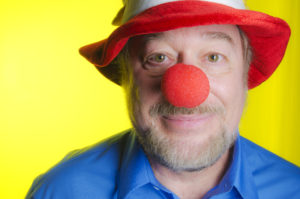 Tip 1: Engage Your Humorous Perspective
Tip 1: Engage Your Humorous Perspective
Humor can reduce and treat anxiety by activating mirth (the emotional reaction to humor), wit (the cognitive reaction to humor), laughter (the physical reaction to humor) and relational fusion (the social/ interpersonal reaction to humor).
Most anxiety is caused by the thinking process (conscious or auto-pilot) of the individual. Processing humor adds perspective which in turn reduces anxiety.
Mirth, the emotional experience of humor, dissolves anxiety even if only momentarily. It can teach individuals that they have the capacity to manage their anxiety, and this awareness also reduces anxiety.
Humor triggers laughter which is a physical response to humor, and as one contracts and releases muscles activated with laughter one physically “feels” less anxious.
Humor creates relational fusion which is the social bonding experienced with humor. As individuals bond with others their anxiety is reduced.
All five of these impacts of humor have positive biochemical effects including reduction in serum cortisol (the stress hormone).
Research supports that all 5 of these experiences reduce, manage, and can cure anxiety.
Tip 2: Accept What You Can and Cannot Control
a. When individuals have a plan, they feel “in control” of the perceived future threat which is the trigger of anxiety.
b. When feeling anxious many individuals “do” achievable activities such as cleaning, exercising, shopping, etc.
Tip 3: Embrace Fundamental Truths
a. I will get through it not matter what “it” is
b. I have always have gotten through every life’s challenges. I have survived every bout of anxiety. I may experience the discomfort of feeling anxious but have always gotten through it. Truly embracing that you have been able to get through/survive all life’s challenges and will get through this one can be relieving.
Tip 4: Reevaluate Priorities
a. Ask yourself, “What is the worst that will happen if…” In the short term these are “management” (but not curative) strategies such as over perform, escape (quit, perhaps), avoid, distract, and of course biochemical (medications, alcohol, drugs, etc.). They hep reduce anxiety in the short term. All of these, in the long term, are ineffective and even harmful.
Tip 5: Activate Perspective
b. “Whatever lies before me is another of life’s inconveniences (everyday events) in a larger life perspective.” When people see perspective the “situation” before them shrinks in magnitude and becomes less anxiety provoking. Perspective is one of the most potent ways to reduce anxiety and stress. Anxiety is mostly caused by an exaggerated negative view of oneself, situations, or the world. Perspective shifts that negative view.
Tip 6: Reduce Shoulding and Musterbating
a. Virtually all anxiety is generated by the way we think. The negative thinking associated with feeling anxious involves shoulds, musts, have to’s and oughts. When one reframes these with “preferences” (wants, preferences, wishes, and desires) my anxiety dissipates. While you may not like some activity (e.g. your job) if you practice replacing shoulds with wants you will reduce your anxiety will diminish. Say “I want… or I prefer…” instead of “I must… I should… I have to…” Shoulds are demands we place on ourselves. Ultimately, all “actions” are based on wants and preferences and not on shoulds.
Tip 7: Embrace Gratitude
a. Every day focus on 3 things for which you are grateful. Say them to yourself and/or others. Write them down (perhaps in a journal) or represent them symbolically perhaps with buttons, marbles, paperclips, etc. Gratitude is an uplifting emotion. Uplifting emotions and distressing emotions such as anxiety cannot occupy the same psychological space. Research has consistently found that when we are grateful our stress level is reduced.

Recent Comments